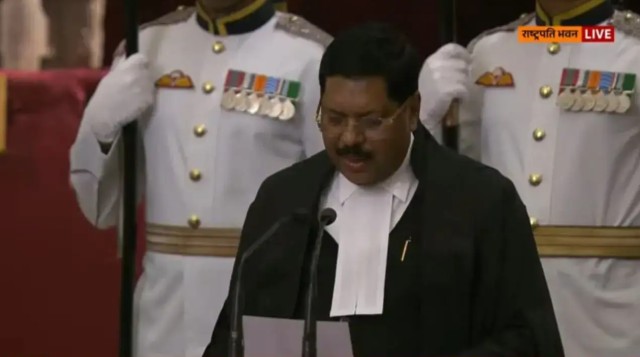
Source: NDTV
Justice Bhushan Ramkrishna Gavai was sworn in as the 52nd Chief Justice of India on Wednesday. The oath ceremony took place at Rashtrapati Bhavan, and President Droupadi Murmu administered the oath. Justice Gavai succeeds Justice Sanjiv Khanna, who held the position briefly.
With this, he becomes the first Buddhist and the second Dalit to head the country’s judiciary.
The event drew prominent dignitaries. President Murmu, Vice President Jagdeep Dhankhar, Prime Minister Narendra Modi, and Lok Sabha Speaker Om Birla congratulated the new Chief Justice. Justice Sanjiv Khanna was also present to extend his best wishes to his successor.
A Brief Yet Significant Tenure Ahead
Justice Gavai will serve as Chief Justice for six months before retiring in November this year. Though brief, his tenure is expected to be impactful, considering his judicial track record.
He began his legal journey in 1985, practicing in the Bombay High Court. In 2003, he became an Additional Judge there, and two years later, a permanent judge. His elevation to the Supreme Court came in 2019.
A Judge Known for Landmark Verdicts
As a Supreme Court judge, Justice Gavai played key roles in several historic decisions. Notably, he was part of the bench that upheld the Centre’s 2016 demonetisation. He also ruled against the controversial electoral bonds scheme, calling it unconstitutional.
He has authored nearly 300 judgments. Many of these were delivered by Constitution Benches and involved crucial issues related to fundamental rights.
India’s First Buddhist Chief Justice
Justice BR Gavai has become the first Buddhist to hold the position of Chief Justice of India. Calling it a “great coincidence,” he noted that his oath-taking came just two days after Buddha Purnima.
On May 12, he and his family visited Delhi’s Shanti Stupa to mark the sacred occasion. Justice Gavai shared that his family has followed Buddhism since 1956. That year, his father converted during the historic movement led by Dr. Babasaheb Ambedkar. Over half a million Dalits embraced Buddhism in that landmark event.
Since then, his entire family has remained devoted to the faith, a tradition Justice Gavai continues to uphold.
A Legacy Rooted in Social Justice
Justice Gavai also becomes the second Dalit to occupy the Chief Justice's office, after Justice KG Balakrishnan, in the 75-year history of the Supreme Court. His appointment holds symbolic significance for India’s judicial diversity.
His father, RS Gavai, was a noted social activist and politician. He served as Governor in three states and was a member of both Houses of Parliament. He also founded the Republican Party of India (Gavai), reflecting a lifelong commitment to social reform.
Legal Community Praises the New CJI
Dr Abhishek Manu Singhvi, senior lawyer and Member of Parliament, described Justice Gavai as pragmatic and result-oriented. He highlighted the new CJI’s command over courtroom proceedings and praised his sense of humour. “I wish he had a longer tenure,” Dr Singhvi added. Solicitor General Tushar Mehta echoed this admiration. He called Justice Gavai “humility personified” and lauded his intellectual independence. Mehta emphasized the CJI’s impartiality and legal brilliance across all domains of law.
According to Mehta, Justice Gavai represents the best of India’s judicial tradition. “He carries forward Dr Ambedkar’s legacy with grace, without showmanship,” he noted.
Looking Ahead
As Justice Gavai steps into the country’s highest judicial role, expectations are high. His legacy of fairness, clarity, and commitment to justice is likely to shape key rulings during his tenure.
Though his time in office may be short, his influence on the Indian legal landscape could be long-lasting.















